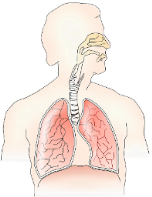
Mousumi Gupta gives the lowdown on how to stay safe from respiratory illness, specially during the onset of winter.
“I was having a bad cough for few days and then one morning I woke up with breathing difficulties. I have had asthma for quite a long time. So quite naturally I thought it to be another asthmatic attack. But after some prescribed lung function tests, I was diagnosed with COPD (chronic obstructive pulmonary disease). I was worried at the beginning. However, the doctor prescribed me some medicines, asked me to use an inhaler and advised me to take the Pneumococcal Vaccine. I had to do some breathing exercise as well, and now I feel fit once again and can do all my household chores as before.”
As told by our member Mrs. Chhanda Dasgupta.
Respiratory infections are common at all ages but are particularly problematic among the elderly because of their fragility and weakened immunity. The most common types of respiratory infections in the elderly are pneumonia, COPD and non-pneumatic respiratory tract infection.
During the winter season, especially during the arrival of winter, exposure to cold often causes the body temperature to drop below the normal level. At an older age, the risk of decreasing body temperature is particularly high.
Causes of Pneumonia
- Bacteria are the most common cause of pneumonia. This type of pneumonia can occur normally after severe cold and flu.
- Viruses that cause cold and flu can lead to pneumonia. These are usually mild, though there are exceptions.
- Fungi is another cause of pneumonia. This type of pneumonia is most common in people with chronic health problems or weak immune systems.
Most of the time, our body can effectively filter out these harmful organisms. But sometimes these germs can overpower the immune system.
Some of the common symptoms of Pneumonia include:
-
Shortness of breath
-
Chest pain while breathing
-
Confusion or changes in mental awareness (in adults age 65 and older)
-
Cough, which may produce phlegm
-
Fever, sweating and chills
COPD (chronic obstructive pulmonary disease)
COPD can occur if someone has asthma. This is a group of progressive lung diseases.
Causes of COPD
-
The primary cause of chronic obstructive pulmonary disease is cigarette smoking or exposure to tobacco smoke.
-
Prolonged exposure to air pollution, such as the fumes released while burning coal or wood and industrial air pollutants.
-
Infectious diseases that destroy lung tissue in patients with hyperactive airways or asthma can also cause COPD.
The symptoms are very similar to that of pneumonia. Other signs and symptoms of COPD may include:
- Tightness of the chest
- Frequent respiratory infections
- Lack of energy
- Unintended weight loss
- Swelling in ankles, feet or legs
Recommendations for people with Respiratory Illness
A healthy diet along with regular exercise, especially breathing exercises can help overcoming the severity.
To lower the risk of respiratory infections, after consulting a doctor, annual flu vaccination and vaccination against pneumococcal pneumonia may be.
Flu Vaccine
Once a year, usually starting in September through the end of the flu season, which can last as late as May.
Pneumococcal Vaccine
Even if you are healthy, but above 65 years of age you may need to take the pneumococcal vaccine. The pneumonia vaccines are quite safe, and they are very helpful in preventing such illnesses. An organised approach to assessing elderly patients and an awareness of common pitfalls in the diagnosis and management of pneumonia are essential.
*Note: Take your doctor’s advice before deciding to take any vaccination.
Picture credit: lungs/www.pixabay.com/CC0



